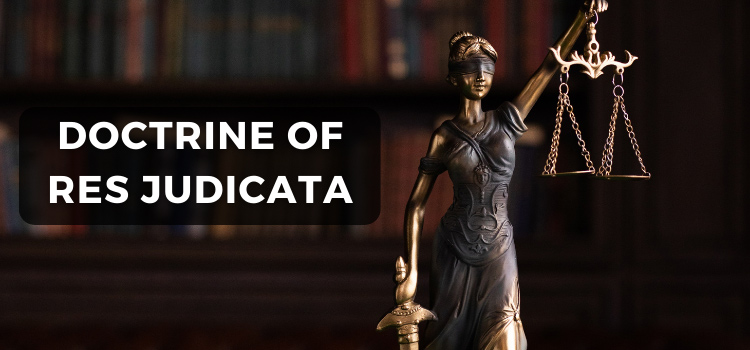Res judicata is a fundamental legal doctrine that ensures finality in litigation. Translated from Latin, it means “a thing decided.” In legal terms, it prevents the same parties from re-litigating a matter that has already been judged by a competent court. The principle plays a crucial role in maintaining the integrity and efficiency of judicial systems around the world. Once a decision is made, it must be respected and upheld to avoid legal chaos.
When courts apply res judicata, they affirm that justice has been served and should not be disturbed unnecessarily. The doctrine exists not only to protect the legal rights of parties but also to conserve judicial resources. Without it, courts would face a flood of repetitive cases, and litigants could endlessly challenge outcomes they dislike. It supports a legal environment where rulings are final, predictable, and respected.
What is Res Judicata?
The doctrine of res judicata is deeply rooted in legal history, serving as a shield against repetitive lawsuits. It bars the re-litigation of claims or legal disputes that have already received a final decision on their merits. If a plaintiff brings a case to court and loses, they cannot file another lawsuit on the same issue just by altering the language or legal grounds slightly. That’s exactly what res judicata is designed to stop.
This concept is used across many legal systems, including those based on common law and civil law traditions. In practice, res judicata promotes judicial efficiency and fairness by encouraging parties to fully present their case the first time around. Once a judgment is passed, the legal system treats the matter as resolved and closed to further challenge.
Meaning and Definition of Res Judicata
The res judicata meaning in law is widely recognized as the doctrine that prevents re-litigation of a legal claim or cause of action once it has been resolved. Legal scholars and courts define it as a form of claim preclusion, where a prior judgment is binding in any future case involving the same issues and the same parties. The objective is to protect the credibility and finality of judicial decisions.
To define res judicata more precisely: it is a rule that ensures once a competent court has issued a final verdict on a case, that matter is settled permanently. Even if one party discovers new arguments or rephrases old ones, they are not allowed to reopen the dispute. This legal closure benefits both the courts and litigants by avoiding unnecessary litigation and conflicting rulings.
Elements of the Res Judicata Doctrine

For the doctrine of res judicata to apply, specific legal elements must be met. First, there must be a final judgment rendered by a court that has proper jurisdiction. Second, the judgment must have been decided on the merits of the case, not merely dismissed on technical grounds. Third, the parties in the new case must be the same as—or in legal privity with—those in the previous case.
The fourth and final element is that the cause of action or issue must be identical to what was previously adjudicated. These elements of res judicata ensure that courts apply the doctrine fairly and only in cases where repeated litigation truly threatens legal stability. When all these elements are present, the court can confidently block further proceedings under the shield of res judicata.
Res Judicata vs. Collateral Estoppel
Although often confused, res judicata and collateral estoppel are distinct legal doctrines. Res judicata, or claim preclusion, bars entire lawsuits that have already been decided. In contrast, collateral estoppel, also known as issue preclusion, prevents the re-litigation of specific issues that have been previously resolved, even if brought up in a different case.
The key difference in collateral estoppel vs res judicata lies in scope. Res judicata shuts the door on a whole case being retried, while collateral estoppel only restricts individual facts or issues within a different claim. Lawyers must clearly understand both doctrines to avoid repeating barred arguments or misapplying legal strategies. Both are essential tools in protecting the integrity of court judgments.
Examples and Applications of Res Judicata in Law
Consider a scenario where a homeowner sues a builder for breach of contract due to poor construction. The court hears the case and rules in favor of the builder. If the homeowner then tries to sue the builder again for the same issue, perhaps claiming negligence instead of breach of contract, the doctrine of res judicata would prevent the new case from moving forward.
This res judicata example shows how the doctrine works in real-world situations. It is applied across various legal fields, from civil to administrative law, and even international arbitration. Courts use res judicata not just to protect parties from endless litigation, but also to ensure consistent and reliable outcomes. The doctrine ensures that litigants cannot relitigate settled matters, even under different legal labels.
Importance and Limitations of the Doctrine
The res judicata doctrine serves as a backbone of legal finality. It assures parties that once a case is resolved, they can move on without the fear of future legal battles on the same issue. This sense of closure fosters confidence in the legal system and encourages full participation during the initial trial, knowing that there will be no second chances.
However, like all legal doctrines, res judicata has its limitations. It may not apply if the court lacked jurisdiction, if fraud tainted the judgment, or if significant new evidence surfaces that was not available during the original trial. These exceptions serve as important safety valves, preventing res judicata from being misused to uphold unjust or flawed decisions.
Conclusion
Res judicata is more than just a procedural technicality—it is a powerful principle that underpins the reliability of legal decisions. It provides peace of mind to litigants and ensures the legal system runs efficiently by preventing duplicate lawsuits. Once a case is closed, it stays closed, and all parties involved can move forward with certainty.
Understanding what res judicata means and how it differs from related doctrines like collateral estoppel is essential for anyone involved in litigation. Whether you are drafting pleadings, evaluating risks, or interpreting a court’s decision, the principle of res judicata offers a firm foundation for building a clear legal path forward.
FAQs
What does res judicata mean?
Res judicata means “a matter already judged.” It prevents a case from being tried again between the same parties once a final decision has been made.
What are the elements of res judicata?
The key elements are: a final judgment, same parties, same cause of action, and a court with proper jurisdiction.
What’s the difference between res judicata and collateral estoppel?
Res judicata bars re-litigation of entire cases; collateral estoppel prevents the re-litigation of specific issues decided in earlier cases.
Can res judicata be challenged?
Yes, under exceptions like lack of jurisdiction, fraud, or newly discovered evidence, a case barred by res judicata may be revisited.
Is res judicata applicable in criminal law?
It can apply in certain criminal law contexts, but is often supplemented or replaced by the constitutional protection against double jeopardy.
You may also read: Explore Billerica’s Top Attractions and Outdoor Activities


